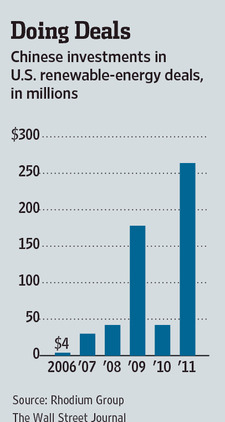 Nifty WSJ full-page report in mid-June entitled, "Beneath a war of words, money paints a different China-U.S. picture." The subject? Chinese investments in US renewable energy efforts.
Nifty WSJ full-page report in mid-June entitled, "Beneath a war of words, money paints a different China-U.S. picture." The subject? Chinese investments in US renewable energy efforts.
Just like in the case of hydraulic fracking, we see the Chinese eager to collaborate.
Naturally, as the less advanced technology economy, the Chinese are eager to go beyond collaboration into . . . ahem . . . aggressive collaboration, let's say. But let's be honest: that's the incentive for the less-technologically gifted party in any technological investment. For the more advanced party, the goal is an expanded pool of opportunity over time:
Read the headlines and you find a war of words between the U.S. and China over clean energy, with the two countries trading barbs over whether Chinese solar-panel makers are dumping their wares onto the U.S. market at prices so low they're illegal. Follow the money more broadly, however, and you see something different: clean-energy investors and executives from the two countries starting to do deals.
Chinese businesses, typically with Beijing's support, are beginning to buy stakes in U.S. clean-energy companies and projects, often with Washington cheering. The deals span technologies from cleaner ways to burn coal to cheaper ways to use renewable power.
Each side has reasons to expand this capital flow. The Americans get the Chinese money and, with it, access to China's vast market, which is far hungrier for clean-energy innovation than the U.S. The Chinese get U.S. technology to help sate their soaring energy demand, and a place to invest that looks positively low-risk compared with their home turf.
As for the fears? Money talks - no matter the language.
One reason is economic. Federal stimulus money for the energy industry is tapering off, and other federal clean-energy subsidies, many of which failed to deliver enough bang for the buck, are likely to get pared back, too. More than ever, U.S. clean-energy companies could use the help of China's investors and consumers.
Another reason is environmental. Many clean-energy technologies are getting cheaper but are still too expensive to compete against conventional fossil fuels. The only way they stand much chance of gaining real scale is if the world develops and deploys them in the most economically efficient way: across national borders. Moreover, if American clean-energy technologies aren't deployed in China, where air pollution is thick and greenhouse-gas emissions are rising, then whatever cleanup those technologies accomplish on U.S. soil won't much matter.
Thank God for the logic of businesspeople. Imagine if the Pentagon could aspire to such thinking.